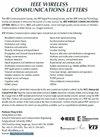基于元格式的轻量级神经网络用于大规模多输入多输出 CSI 反馈
IF 4.6
3区 计算机科学
Q1 COMPUTER SCIENCE, INFORMATION SYSTEMS
引用次数: 0
摘要
本文章由计算机程序翻译,如有差异,请以英文原文为准。
MetaFormer-Based Lightweight Neural Network for Massive MIMO CSI Feedback
Channel state information (CSI) is usually estimated by the user equipment (UE) and fed back to the base station (BS). The quality of the CSI received by the BS significantly impacts the performance of large-scale multiple-input-multiple-output (MIMO) system. The CSI feedback consumes a large amount of uplink bandwidth resources, especially in massive MIMO system. Traditional CSI feedback methods cause feedback performance bottlenecks due to their computational error and complexity limitations. In recent years, deep learning (DL)-based CSI feedback methods have made significant progress. However, most of the existing DL-based methods improve CSI feedback performance at the cost of higher computational complexity. In this letter, we introduce the MetaFormer generic lightweight architecture to CSI feedback and design a lightweight feedback model PFNet based on it, which employs pooling operations instead of the attention mechanism in the traditional Transformer architecture, thus significantly reducing the complexity. Experimental results show that PFNet outperforms current lightweight SOTA networks in most scenarios.
求助全文
通过发布文献求助,成功后即可免费获取论文全文。
去求助
来源期刊

IEEE Wireless Communications Letters
Engineering-Electrical and Electronic Engineering
CiteScore
12.30
自引率
6.30%
发文量
481
期刊介绍:
IEEE Wireless Communications Letters publishes short papers in a rapid publication cycle on advances in the state-of-the-art of wireless communications. Both theoretical contributions (including new techniques, concepts, and analyses) and practical contributions (including system experiments and prototypes, and new applications) are encouraged. This journal focuses on the physical layer and the link layer of wireless communication systems.
 求助内容:
求助内容: 应助结果提醒方式:
应助结果提醒方式:


